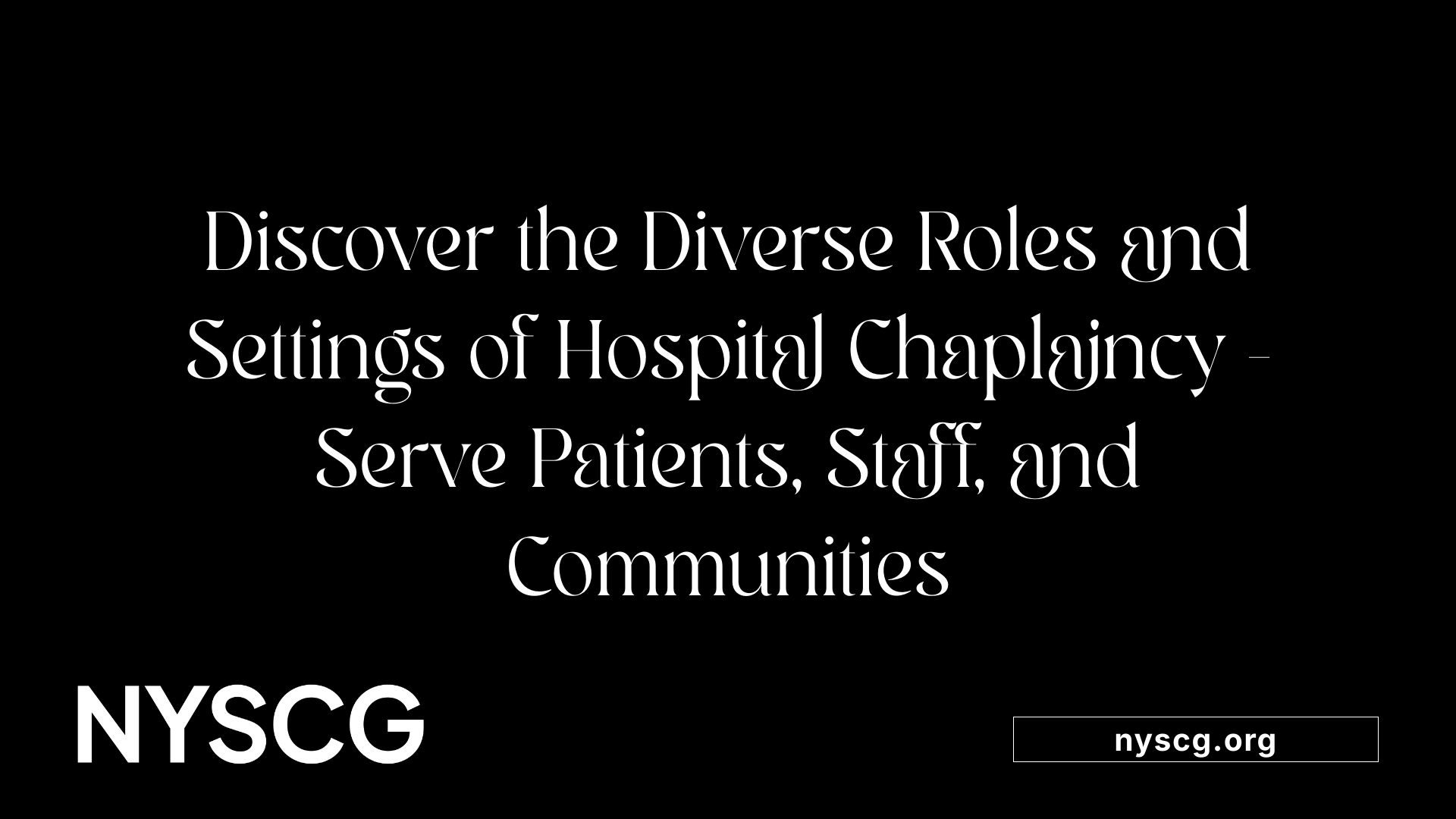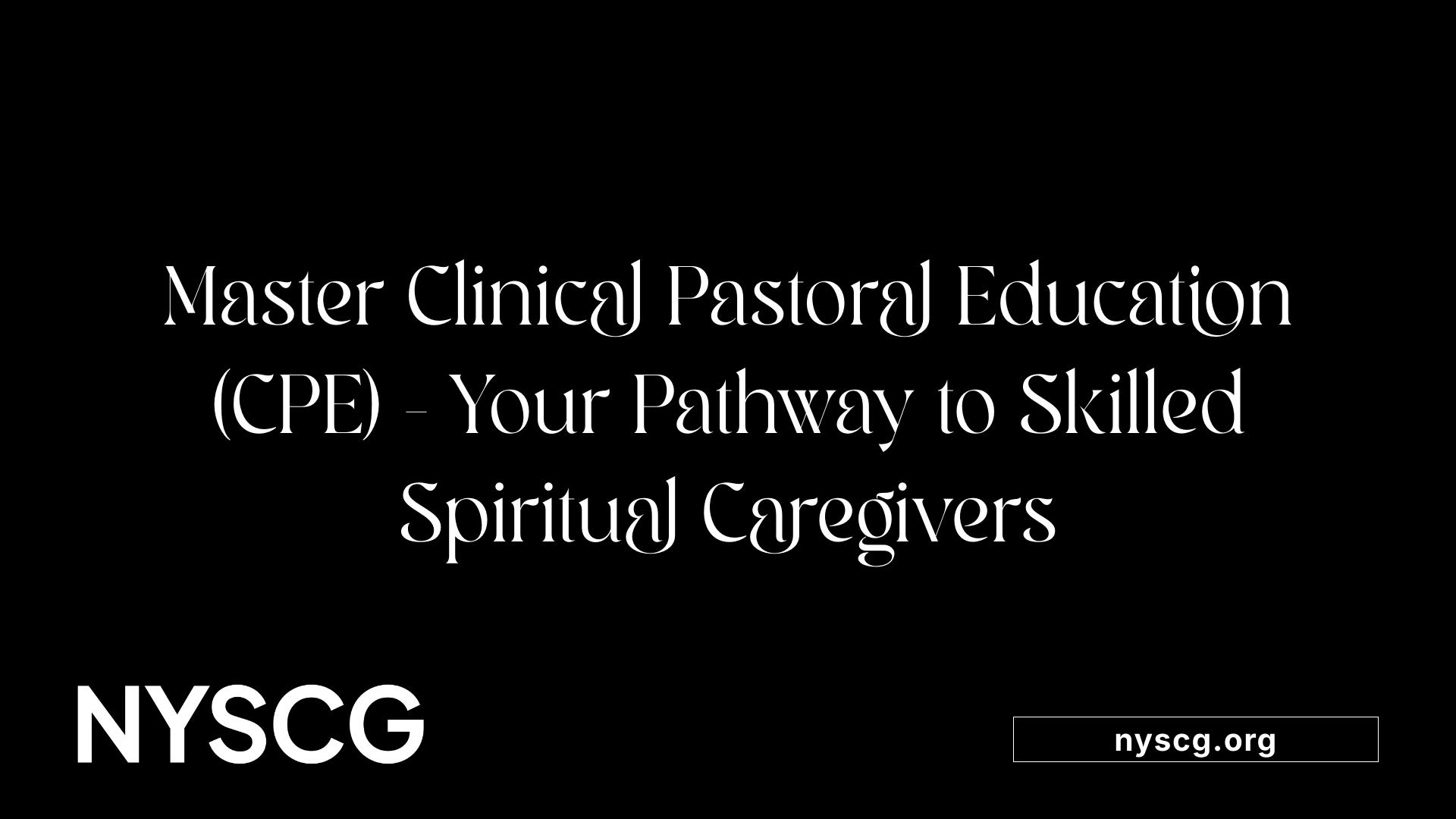How to Start a Career in Hospital Chaplaincy Without a Seminary Degree


Starting a career in hospital chaplaincy can seem daunting, especially without a seminary degree. However, many alternative routes and innovative pathways make entering this compassionate profession accessible. This article explores how individuals can pursue hospital chaplaincy through diverse educational programs, certifications, and practical training, emphasizing that a traditional seminary background, while common, is not the only route to serving in this vital field.

Hospital chaplains provide spiritual and emotional support to patients, families, and staff during challenging times. They offer prayer, counseling, and comfort related to diagnoses, surgeries, traumatic injuries, and end-of-life issues. Chaplains are trained to address spiritual needs, facilitate religious rites, and help individuals find peace amidst medical crises.
While hospitals are the primary setting, chaplains also work in mental health clinics, long-term care facilities, hospices, prisons, and military bases. These diverse environments require chaplains to adapt their spiritual care to various populations and circumstances.
Chaplains assist patients and families by counseling about diagnosis and treatment options, offering prayers, and performing religious rites such as baptisms or Eucharist when appropriate. They help individuals cope with traumatic events and prepare for end-of-life transitions, ensuring spiritual needs are respected and attended to.
No, you do not have to go to seminary to become a chaplain, but you do need appropriate spiritual formation and training. Typically, this includes earning a bachelor's degree followed by a master's degree in theology or a related field, such as an MDiv, which provides essential ministry, counseling, and leadership skills.
In addition, completing Clinical Pastoral Education (CPE) and obtaining endorsement from a recognized faith organization are important steps. Many chaplains also pursue certification from professional organizations like the APC to enhance their credentials.
While ordination is not always required, especially in secular settings, comprehensive education and training are crucial for success in chaplaincy roles.
Training programs like Clinical Pastoral Education (CPE) are vital for hands-on experience. CPE involves clinical hours, reflective study, and supervision, generally completed at accredited sites. Certification through organizations such as the Association of Professional Chaplains (APC) can also validate a chaplain's competence and readiness.
Interested individuals should start by talking to experienced chaplains, engaging in spiritual reflection, and pursuing relevant education. They may also consider online or local training options, short courses, or extensive CPE units. Networking through hospitals and faith communities can help find practical placement and job opportunities.
| Aspect | Details | Additional Info |
|---|---|---|
| Education | Bachelor's in any field, Master's preferably in Theology or Divinity | An MDiv typically involves 72 hours of advanced study |
| Training | Clinical Pastoral Education (CPE) | At least 4 units, each with 100 educational hours and 300 clinical hours |
| Certification | Membership with APC or similar | Certification enhances employment prospects and professional credibility |
| Work Environments | Hospitals, mental health centers, hospices | Includes secular and faith-based healthcare organizations |
| Ideal Candidates | Those pursuing religious, theological, or pastoral training | Experience from diverse fields like nursing, social work is also valued |
 Becoming a hospital chaplain requires a solid educational background that can vary depending on the setting and employer. At minimum, candidates need to complete an accredited bachelor's degree. Interestingly, the specific major of the bachelor's degree isn’t rigid; students can choose a variety of fields as long as they meet the subsequent requirements.
Becoming a hospital chaplain requires a solid educational background that can vary depending on the setting and employer. At minimum, candidates need to complete an accredited bachelor's degree. Interestingly, the specific major of the bachelor's degree isn’t rigid; students can choose a variety of fields as long as they meet the subsequent requirements.
For those aiming to advance, a master’s degree is typically essential. Degrees such as a Master of Divinity (M.Div.), Master of Arts in Pastoral Care and Counseling, or similar advanced theological programs are highly valued. For example, the MAPCC program prepares students specifically for pastoral care roles in healthcare environments.
Some universities offer dedicated pathways for aspiring chaplains. For instance, Georgia State University provides a specialized program that combines a master's degree in Religious Studies with a graduate certificate in Chaplaincy Studies. Such programs often include coursework in scripture, theology, ethics, and intercultural skills, alongside practical clinical training.
Partnerships with established institutions are crucial. Georgia State University is notably the first public university to collaborate with the Association of Professional Chaplains (APC) for this pathway. Students typically start with their master’s studies and proceed to earn necessary certifications or endorsements.
In addition to formal education, clinical pastoral education (CPE) plays a vital role. CPE involves supervised practical training, typically at hospitals or other medical centers. Completing 4 units of CPE, each with extensive hours, is usually required for certification.
Considering training options, many chaplains undertake CPE through ACPE-accredited programs, which include elements like patient visits, group discussions, and supervision. Online and flexible training options are increasingly available, making chaplaincy training accessible to many.
In summary, aspiring hospital chaplains should pursue at least a bachelor’s degree–preferably in a related field–and aim for advanced theological training. Partnering educational programs, combined with supervised CPE, form the backbone of preparation for this meaningful spiritual care career.
| Educational Level | Typical Degree | Additional Requirements | Noteworthy Aspects |
|---|---|---|---|
| Bachelor’s Degree | Any accredited major | None specific; diverse backgrounds eligible | Foundation for further specialization |
| Master’s Degree | M.Div., MAPCC, or similar | Clinical Pastoral Education (CPE); endorsement | Focused on pastoral care, ethics, and theology |
| Certification | APC or others | 4 units of CPE, endorsement from faith group | Professional credentialing, cultural competence |

Clinical Pastoral Education (CPE) is an experiential training program designed specifically for individuals wishing to serve as chaplains in healthcare and other settings. It provides real-world, hands-on experience by involving participants in patient care, group discussions, supervision, and reflective practice. CPE is considered essential because it equips future chaplains with practical skills for pastoral care, emotional support, and crisis intervention, ensuring they are prepared for the complexities of healthcare environments.
There are various formats of CPE programs to suit different needs and schedules. The Extended Part-Time CPE lasts approximately 16 to 18 weeks and is ideal for employed individuals who want flexibility. The Summer Intensive program spans 10 to 14 weeks, offering a concentrated, full-time clinical and educational experience suitable for students during vacation periods. The Residency CPE is a rigorous, year-long, full-time program lasting about 52 weeks. It provides comprehensive training in diverse clinical settings and is designed to prepare participants for certification and professional chaplaincy work.
All recognized CPE programs are accredited by the Association for Clinical Pastoral Education (ACPE), which sets rigorous standards for education quality. Programs involve a minimum of 100 educational hours and 300 clinical hours per unit, with most residencies requiring multiple units of CPE—usually 3 to 4—for certification eligibility. The ACPE also mandates that residents and interns participate in supervised patient visits, group work, and reflective studies. Successful completion of these programs enables chaplains to meet national certification requirements and enhances their competency in providing spiritual care.
The process of becoming a chaplain typically takes several years, beginning with earning a bachelor’s degree, which generally takes about four years. Following this, individuals usually pursue a graduate degree in theology or ministry, such as an MDiv, which typically requires three years of study. Additional steps include completing Clinical Pastoral Education (CPE), gaining relevant pastoral or counseling experience, and obtaining endorsement from a recognized religious organization. For those pursuing military chaplaincy, applicants must also complete basic military training and specialized chaplain training, adding additional time. Overall, from undergraduate education to fulfilling all requirements, it generally takes around 7 to 10 years to become a qualified chaplain, depending on the specific pathway and setting.
Endorsements from recognized faith groups are a crucial step in the chaplaincy journey. They serve as official approval from a specific religious body that the individual’s beliefs and practices align with the organization's standards. This endorsement is often required by organizations like the Association of Professional Chaplains (APC) to pursue certification or employment. It affirms that the chaplain is spiritually qualified and committed to serve according to their faith tradition or interfaith principles.
Several professional certification bodies provide accreditation options for chaplains. The Council for Certification of Healthcare Chaplains (CCHC) and the Board of Chaplaincy Certification Inc. (BCCI), which is affiliated with APC, are the most prominent. To become board-certified, chaplains generally need to complete a master’s-level degree (such as M.Div.), accumulate Clinical Pastoral Education (CPE) units, and demonstrate pastoral experience.
The Associate Certified Chaplain (ACC) and Board Certified Chaplain (BCC) are common credentials. The BCCI requires 72 hours of graduate education, four units of CPE, and endorsement from a faith group. These certifications are gateways to higher-level roles within healthcare, military, and institutional chaplaincy, and they affirm professionalism and standardized competence.
Interpersonal skills are fundamental for effective chaplaincy. Empathy, active listening, cultural sensitivity, and emotional resilience enable chaplains to connect deeply with those in distress or crisis. Hands-on experience through CPE and other practical training helps develop these skills. Superior interpersonal abilities foster trust and rapport with patients, families, and colleagues.
Experience, both practical and reflective, enhances a chaplain’s capacity to navigate complex spiritual, emotional, and ethical issues. It equips them to handle a variety of settings, from hospitals to prisons, ensuring they provide compassionate, appropriate care. Building strong relationships with supervisors and peers during training not only improves skills but also broadens professional networks.
Yes, there are accredited programs for chaplaincy training. One of the primary forms of accreditation is for Clinical Pastoral Education (CPE), which is often required for chaplaincy roles and is accredited by the Association for Clinical Pastoral Education (ACPE). Many hospitals and healthcare institutions, including prominent centers like Mayo Clinic, offer accredited CPE units, residencies, and internships to prepare chaplains.
These programs typically include supervised clinical practice and are recognized by professional organizations, ensuring standardized training and credentials. In addition, chaplains usually pursue relevant degrees in divinity, theology, or religious studies, often supplemented by certification from professional groups, further supporting their accreditation and professional standing.
 Embarking on a chaplaincy career without a traditional seminary background is increasingly feasible thanks to various educational and experiential routes.
Embarking on a chaplaincy career without a traditional seminary background is increasingly feasible thanks to various educational and experiential routes.
Networking with experienced chaplains is a crucial first step. Connecting with professionals in healthcare, military, or prison chaplaincy provides valuable insights, mentorship, and potential job leads. Attend industry conferences, join professional associations like the Association of Professional Chaplains, and participate in local or virtual meetups.
Gaining practical experience through internships and volunteer roles enhances your resume and skills. Many hospitals and healthcare facilities offer Clinical Pastoral Education (CPE) programs, which are essential for certification and practical training. Volunteering at community centers, hospices, or faith-based organizations can also build experience while exploring personal calling.
When it comes to job search strategies, creating a strong professional profile is vital. Highlight relevant training, CPE units, any pastoral or counseling experience, and your commitment to spiritual care. Use online platforms, job boards, and direct inquiries to healthcare institutions. Networking and word-of-mouth often lead to openings not publicly advertised.
Can you become a hospital chaplain without attending seminary? Yes, it is possible to become a hospital chaplain without attending traditional seminary, provided you acquire the necessary education, training, and credentials such as clinical pastoral education (CPE). Some pathways focus on alternative educational routes and certifications that recognize relevant ministry training and experiential learning.
Continued education, such as certificates in chaplaincy or pastoral counseling, can further bolster your qualifications. Seeking endorsement from your faith group or a recognized religious authority is also often required.
By actively engaging in these steps—building a network, gaining hands-on experience, and seeking appropriate certifications—you can successfully pursue a fulfilling career in spiritual care even without a seminary degree. Search using terms like "non-seminary hospital chaplaincy pathways" to find specific programs and opportunities tailored for this route.

Individuals interested in becoming hospital chaplains but lacking a seminary education can still forge a meaningful career in spiritual care. A vital first step is exploring accredited degree programs in theology, religious studies, or related fields offered by institutions like Florida State University (FST). While these are not always seminary degrees, they provide foundational knowledge necessary for chaplaincy.
An essential component of training is Clinical Pastoral Education (CPE). CPE offers hands-on clinical training in pastoral care within healthcare environments, involving multiple units that combine educational hours with practical experience. Completing at least four units of CPE, often through accredited centers, is a standard requirement for certification and gaining confidence and competence in patient interaction.
Endorsement from a recognized faith group or organization, such as the Federation for Christian Ministries or the APC, is often required. This endorsement legitimizes your role and qualifies you for many chaplain positions.
Certifications, such as those from the Association of Professional Chaplains, enhance employability. While certification procedures vary, they usually involve demonstrating sufficient training, clinical experience, and a commitment to ethical standards.
Networking and active engagement with experienced chaplains help in understanding the profession's demands and opportunities. Many hospitals and healthcare organizations value interpersonal skills highly, especially active listening, crisis management, and empathy.
Many chaplains serve successfully without traditional seminary training by combining alternative degrees, extensive CPE, certification, and endorsements. The profession recognizes that intercultural competence, empathy, and practical experience are critical. Aspiring chaplains should focus on building these skills and seeking mentorship through internships, volunteer work, or chaplaincy programs.
The journey to becoming a hospital chaplain is accessible to those motivated to serve others through spiritual care. While traditional paths are common, they are not the only options. By pursuing accredited education, engaging in CPE, obtaining necessary endorsements, and developing strong interpersonal skills, individuals can fulfill their calling and make a meaningful difference in healthcare settings.
For those exploring pathways, searches using phrases like "how to become hospital chaplain without seminary" can provide valuable resources and programs tailored for non-traditional students. Staying committed to the calling and leveraging available training opportunities opens doors to a rewarding chaplaincy career even without a seminary degree.
Entering hospital chaplaincy without a seminary degree is not only possible but increasingly accessible due to diverse educational options, rigorous clinical training programs like CPE, and supportive certification processes. Whether through accredited degree programs, online learning, or specialized training centers, aspiring chaplains can find pathways that fit their backgrounds and calling. The key is to pursue relevant education, gain practical experience, obtain endorsement and certification, and build a network within healthcare and faith communities. With dedication and the right training, many individuals from various educational and professional backgrounds are successfully serving as compassionate, effective hospital chaplains, providing essential spiritual support to those in need.
All you need is the will to make the world a better place.
New York State chaplain group inc. is a tax deductible organization with a federal tax Id number 92-383-4921